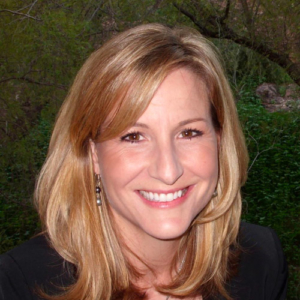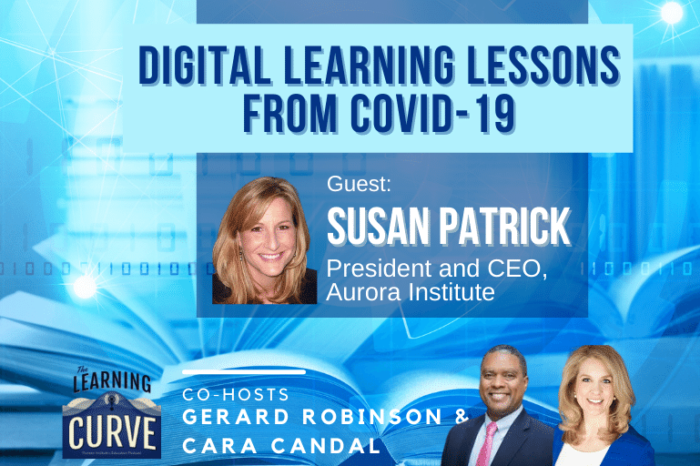Aurora Institute’s Susan Patrick on Digital Learning Lessons from COVID-19
This week on “The Learning Curve,” co-hosts Gerard Robinson and Cara Candal talk with Susan Patrick, the President and CEO of Aurora Institute and co-founder of CompetencyWorks. Susan shares observations about the long-term implications of the COVID-19 pandemic for American K-12 education, and the prospects for expanding digital learning. They discuss the overall quality of the remote and blended learning America’s K-12 school districts offered during the pandemic, and which states excelled. Susan shares thoughts on how digital models can help address pre-pandemic achievement gaps and learning loss due to COVID-19, especially among poor, minority, and rural students. They also review claims by skeptics of digital schooling about its efficacy for early childhood, urban, or special needs students, and best practices drawn from the pandemic for better serving these groups. Susan provides insights around digital schooling and some policy levers that national, state, and local leaders should explore to improve K-12 education.
Stories of the Week: In Michigan, families have filed suit against the state Department of Education and Ann Arbor Public Schools claiming they received inadequate special education services during the pandemic. New survey results from New America and Rutgers University find that, a year after pandemic-related school closures, 15 percent of lower-income students in a nationally representative sample still lack fast and reliable internet access at home.
Guest:
 Susan Patrick is the President and CEO of Aurora Institute and co-founder of CompetencyWorks, providing policy advocacy, publishing research, developing quality standards, and driving the transformation to personalized, competency-based education forward. She is a Pahara-Aspen Fellow and was a USA Eisenhower Fellow in 2016. Susan is the former Director of the Office of Educational Technology at the U.S. Department of Education, and served as legislative liaison for Governor Hull from Arizona. She served as legislative staff on Capitol Hill. Patrick holds a master’s degree from the University of Southern California and a bachelor’s degree from Colorado College.
Susan Patrick is the President and CEO of Aurora Institute and co-founder of CompetencyWorks, providing policy advocacy, publishing research, developing quality standards, and driving the transformation to personalized, competency-based education forward. She is a Pahara-Aspen Fellow and was a USA Eisenhower Fellow in 2016. Susan is the former Director of the Office of Educational Technology at the U.S. Department of Education, and served as legislative liaison for Governor Hull from Arizona. She served as legislative staff on Capitol Hill. Patrick holds a master’s degree from the University of Southern California and a bachelor’s degree from Colorado College.
The next episode will air on Wednesday, July 14th, 2021 at 12 pm ET with guest, Dr. Morgan Hunter, a Research Fellow at the Independent Institute in California, and with Dr. Victor Davis Hanson and Dr. Williamson Evers, co-author of the white paper, Is It Time for a “490 B.C. Project”?: High Schoolers Need to Know Our Classical Heritage.
Tweet of the Week:
You know what is infrastructure? School transportation.https://t.co/ztqX63tstG
@bellwethered
— Andrew Rotherham (@arotherham) July 6, 2021
News Links:
Students sue Michigan, school district over inadequate special education services
Closing the homework gap so ‘no child is left offline’
https://hechingerreport.org/closing-the-homework-gap-so-no-child-is-left-offline/
Get new episodes of The Learning Curve in your inbox!
Browse recent episodes:













